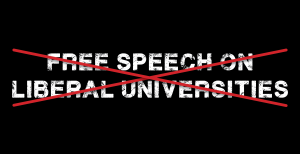 On February 10, 2017, a federal judge sitting in the U.S. District Court for the Western District of New York issued an important First Amendment ruling in the civil rights lawsuit filed by the American Freedom Law Center (AFLC) against several officials from the State University of New York at Buffalo (SUNY-Buffalo). The case is captioned Center for Bio-Ethical Reform, Inc. v. Black.
On February 10, 2017, a federal judge sitting in the U.S. District Court for the Western District of New York issued an important First Amendment ruling in the civil rights lawsuit filed by the American Freedom Law Center (AFLC) against several officials from the State University of New York at Buffalo (SUNY-Buffalo). The case is captioned Center for Bio-Ethical Reform, Inc. v. Black.
In this lawsuit, AFLC sued SUNY-Buffalo officials on behalf of the Center for Bio-Ethical Reform, Inc., a national pro-life group, and its student sponsors for permitting an unruly mob of pro-abortion protestors to purposely disrupt a peaceful, pro-life demonstration on the university’s campus.
In his decision denying the motion to dismiss filed by the SUNY-Buffalo officials, who argued that the lawsuit failed to state a constitutional violation, the federal judge held that
CBR’s “exhibition was unquestionably subject to First Amendment protection,” that “when the University defendants allowed counter-demonstrators to use signs, umbrellas, and bed sheets to block the photo-murals from view,” these facts were “sufficient to allege that the defendants took adverse actions against plaintiffs,” and “that the protected speech was at least a ‘substantial’ or ‘motivating’ factor in defendants’ alleged discriminatory and retaliatory acts.” To that end, the court found “the specific allegations of plaintiffs of statements and circumstances tending to show the defendants were hostile to the content and viewpoint of plaintiffs’ photo-murals, and plaintiffs’ insistence on exercising their rights to freedom of speech, are legally sufficient.”
Robert Muise, AFLC Co-Founder and Senior Counsel, commented:
“Unfortunately, most colleges and universities are run by progressives whose idea of ‘tolerance’ is to shut down, physically or otherwise, any viewpoint they disagree with. We saw what happened recently at Berkeley where ‘tolerant’ and ‘open-minded’ liberals torched the place to silence a speaker. University officials are responsible for permitting such intolerant outbreaks of violence directed toward silencing speech, and this case establishes that point.”
For two days beginning on April 15, 2013, CBR partnered with the student organization to bring CBR’s Genocide Awareness Project (GAP) to the university campus. GAP is a traveling photo-mural exhibit that compares abortion to historically recognized forms of genocide, such as the Holocaust.
CBR and the student organization followed the university’s procedures to reserve a prime location outside of the Student Union for the pro-life display. The request was initially met with resistance from university officials. However, the organizers pointed out that this location had been reserved in the past for student speech activity; therefore, to deny access to this forum for the pro-life display would violate the First Amendment. The officials reluctantly approved the request.
During the actual GAP display, however, university officials permitted protestors to purposely block the graphic, abortion images. At times, the student protestors would use umbrellas and bed sheets to accomplish their task. When the organizers of the event requested assistance from the university police, including its chief of police, they refused, thus prompting this lawsuit.
In his decision, the federal judge also concluded that AFLC’s equal protection claim could advance, stating:
“The Court finds plaintiffs . . . sufficiently allege that they were selectively treated because their photo-mural exhibition was impaired by the acts of similar counter-demonstrators who were favored as a result of the University defendants’ hostile motives to impair plaintiffs’ exhibition and to retaliate for plaintiffs’ exercise of their rights to free speech.”
Muise continued:
“At the end of the day, government officials have an affirmative duty to protect a private citizen’s right to peacefully engage in free speech. Here, SUNY-Buffalo officials grossly breached that duty in violation of the U.S. Constitution.”
David Yerushalmi, AFLC Co-Founder and Senior Counsel, added:
“Instead of fostering the free exchange of ideas in the ‘marketplace of ideas’ that is a university campus, SUNY-Buffalo officials legitimized and encouraged its students to respond to political speech they don’t like with censorship and the denial of free speech. This is very much the tactic of Alinskyite progressives, who would rather violate the Constitution by denying speech that is contrary to the established ‘liberal orthodoxy.’”
